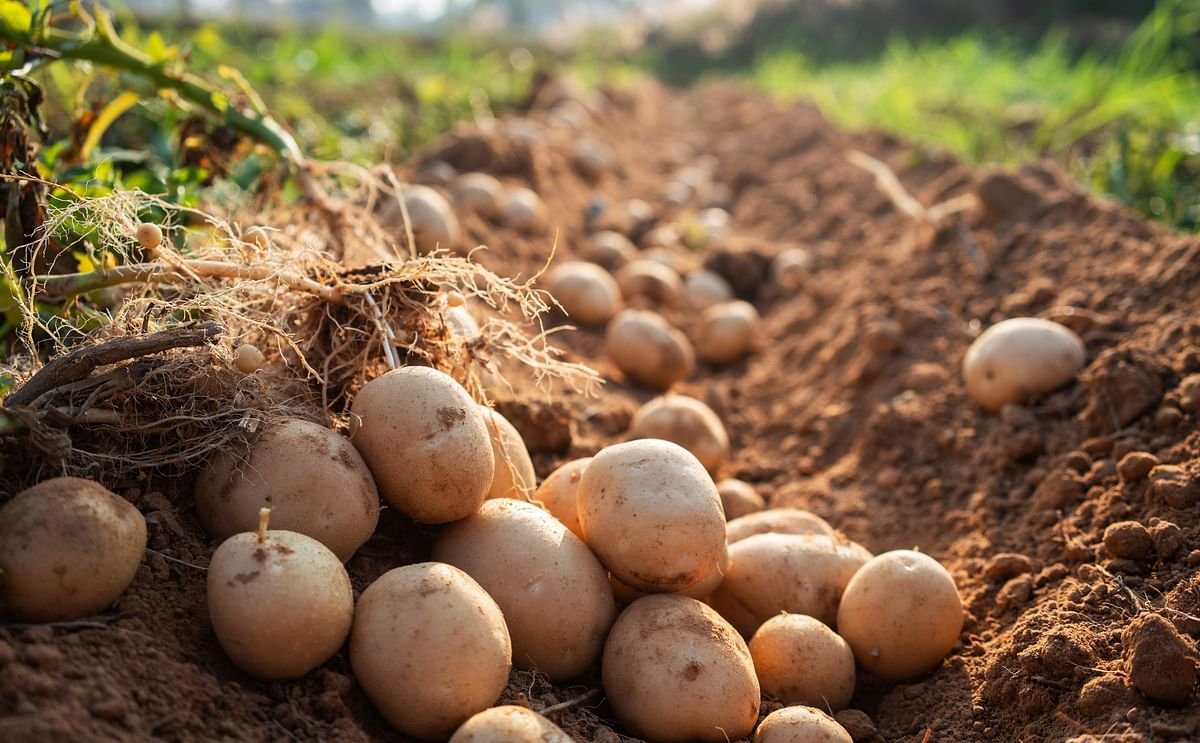Vegetables Farming
Potato Paradise | How Agriculture Grads Put Dolpur Kampa on the Map

Overview of the Blog
In the heart Potato Paradise of rural India, the village of Dolpur Kampa was once just another quiet settlement, with agricultural activities mostly centered around subsistence Potato Paradise. However, the emergence of a group of agriculture graduates brought a transformative change to the region, making Dolpur Kampa a recognized name in the agricultural industry, particularly for potato farming. Their journey to success is a testament to how education, innovation, and perseverance can lead to incredible economic growth and community empowerment.
The Beginnings of Potato Paradise Dolpur Kampa’s Agricultural Transformation
Dolpur Kampa, a village nestled in a rural region, faced many challenges typical of agrarian societies—low productivity, outdated farming techniques, and limited market access. Despite being surrounded by fertile land, local farmers struggled to make ends meet. Potato farming, though an important crop, was not as lucrative as it could be, and the methods used were often inefficient. Farmers lacked the knowledge and resources to improve their yields, which left the potential of the land untapped.

Enter a group of agriculture graduates who had recently completed their studies at a prestigious agricultural university. These graduates, with their fresh ideas and technical knowledge, saw an opportunity to change the fortunes of their village. Their vision wasn’t just about growing potatoes; it was about revolutionizing how farming was approached, introducing more sustainable and profitable methods that would have lasting benefits for the entire community.
Innovation in Farming Techniques
One of the first steps the agriculture graduates took was to introduce modern farming techniques. They began by teaching local farmers about soil health, crop rotation, and pest management. These techniques helped to increase potato yields while reducing the environmental impact. By adopting better irrigation systems, using organic fertilizers, and focusing on soil conservation, they managed to significantly improve the quality of the potatoes.
The graduates also introduced precision farming, a technology-driven approach that relies on data and advanced equipment to monitor and manage farm conditions more effectively. They encouraged the use of GPS systems, drones for crop monitoring, and sensors to measure soil moisture, which allowed farmers to tailor their practices to the specific needs of the land. This innovative approach not only boosted yields but also reduced costs, making potato farming more profitable for the local farmers.
Building a Stronger Community Through Education
The key to the success of Dolpur Kampa’s agricultural transformation was not just the introduction of new farming methods but also the emphasis on education and community involvement. The agriculture graduates understood that change could not happen in isolation; it needed to be a collective effort. They conducted regular workshops and training sessions for farmers, teaching them about the latest developments in agriculture and how to apply them to their land.

These workshops didn’t just focus on technical aspects like farming techniques but also included business training. Farmers were taught about market trends, how to brand and package their produce, and how to engage with buyers directly. The idea was to create a more sustainable agricultural economy, where farmers were not only better equipped to grow crops but also more adept at selling their produce and ensuring a steady income.
Sustainable Growth and Market Access Potato Paradise
As the agricultural practices in Dolpur Kampa improved, so did the quality of the potatoes. The village soon gained a reputation for producing some of the finest potatoes in the region, and demand soared. However, the graduates understood that improving the product was just one part of the equation—they also needed to connect Dolpur Kampa’s farmers with larger markets.
The graduates helped establish a cooperative that allowed farmers to collectively negotiate with wholesalers, retailers, and distributors. This cooperative structure gave the farmers better bargaining power, allowing them to secure better prices for their produce. It also provided them with shared resources, such as storage facilities and transport, which helped reduce waste and improve efficiency.
By securing access to urban markets, the farmers of Dolpur Kampa saw a substantial increase in their income. This newfound economic stability also led to improvements in other areas of the village, such as healthcare, education, and infrastructure. As the potato industry flourished, Dolpur Kampa began to attract attention from government bodies and investors, further propelling the growth of the community.
From Struggling Village to Agricultural Hub
In just a few short years, Dolpur Kampa transformed from a struggling rural village to a thriving agricultural hub. The area became known for its high-quality potatoes, and farmers were now reaping the benefits of modern agricultural practices. What started as a small group of agriculture graduates’ initiative turned into a movement that involved the entire village.
The success of Dolpur Kampa’s potato farming is a clear example of how innovation and education can drive significant change in rural communities. By focusing on sustainable farming practices, market access, and community engagement, the agriculture grads were able to create an ecosystem where farmers could thrive. Their approach not only increased potato production but also enhanced the quality of life for the people of Dolpur Kampa.
The Road Ahead
While Dolpur Kampa has already seen remarkable success, the journey is far from over. The agriculture graduates are now looking into diversifying the crops grown in the region to include other high-demand vegetables and fruits. Additionally, they are exploring new ways to reduce the environmental impact of farming even further, such as incorporating renewable energy sources into the farming process.
Furthermore, Dolpur Kampa’s success story is serving as an inspiration to other rural areas. The graduates hope to expand their reach, working with neighboring villages to help them replicate the same success. They believe that with the right combination of education, innovation, and community spirit, any village can rise above its challenges and become a beacon of agricultural prosperity.
Conclusion
The story of Dolpur Kampa is not just about potatoes; it’s about the transformative power of education, innovation, and community. Through the efforts of a group of dedicated agriculture graduates, the village went from being a forgotten part of the country to becoming a prime example of rural development. Their work has put Dolpur Kampa on the map, not only as a potato producer but as a symbol of what is possible when young minds take the initiative to drive change.
In the end, the success of Dolpur Kampa shows that with the right knowledge, dedication, and support, agriculture can be the key to unlocking new opportunities and empowering communities. As the village continues to thrive, it stands as a shining example of what rural development can look like in the 21st century.





















